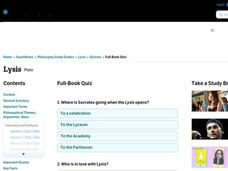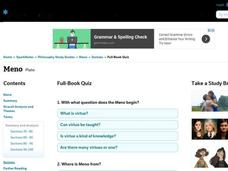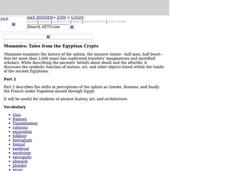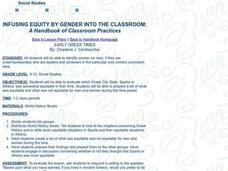Curated OER
Argument in an Athenian Jail: Socrates and the Law
Students consider how Socrates might have responded to extenuating circumstances: for example, if his sentence had been imposed by a tyrant rather than in a trial, or if it had been influenced by prejudice.
Curated OER
Greek Philosophers
In this philosophy learning exercise, students identify some of the most famous Greek Philosophers. They complete a chart that identifies the dates in which they were alive and the philosophical beliefs they shared. There are five Greek...
Curated OER
Charmides
For this online interactive philosophy worksheet, students respond to 10 short answer and essay questions about Charmides by Plato.
Curated OER
Gorgias
In this online interactive philosophy learning exercise, students respond to 30 multiple choice questions about Gorgias by Plato. Students may submit their answers to be scored.
Curated OER
Lysis
For this online interactive philosophy worksheet, students respond to 30 multiple choice questions about Lysis by Plato. Students may submit their answers to be scored.
Curated OER
Meno
In this online interactive philosophy activity, students respond to 15 multiple choice questions about Meno by Plato. Students may submit their answers to be scored.
Curated OER
Tracing the Roots of Modern Cities
Pupils identify several key inventions and other forms of technology that were part of city life during the classical Roman and Greek periods. They report on one characteristic or invention that is shared by modern and ancient cities.
Curated OER
The Great Debate
Students research and debate the British Museum's ownership of the friezes from the Parthenon and Acropolis. Art controversy is discussed in this one-day lesson involving three groups of students within the class.
Curated OER
Who Built the Pyramids?
Students examine the two theories on how the pyramids at Giza were built. They watch a video on pyramids, take notes, and write a five-paragraph essay on how they think the pyramids were constructed.
ProCon
Olympics
Are the Olympic Games a benefit for their host countries and cities? Scholars decide for themselves in preparation for a class debate or discussion. After reading a brief background and overview of the topic, pupils read the top three...
Curated OER
"Ancora Imparo" (Still I Am Learning)
Students study the Italian Renaissance, its impact, and origin. In this Italian Renaissance lesson, students study the Renaissance via the ancient civilizations and political geography of various countries. Students study the art prior...
Curated OER
It's All Greek to Us
Students examine the various ways in which ancient Greek culture has influenced modern-day life. They study the context in which modern-day Greeks consider the 2004 Summer Olympics by reading and discussing the article "Where It All...
Curated OER
Mummies: Tales from the Egyptian Crypts Part II
Students explore the shifts in perceptions of the sphinx as Greeks, Romans, and finally the French under Napoleon moved through Egypt.
Curated OER
The Alphabet is Historic
Young scholars describe how the Phoenicians, Greeks and Romans passed down the alphabet through the generations. They compare and contrast the letters from early alphabets to the one of today and discuss how they are different. Using a...
Curated OER
Italian Renaissance
Fifth graders explore the Italian Rensissance in this six lessons unit. The prominent citizens, the ideas, values, art, philosophy, and literature of the are seen as a rediscovery of Ancient Greek and Roman times.
Curated OER
Prometheus, the Firebringer
Students explore the world of Greek mythology by studying briefly each of the Gods.
They explore the visual world of Greek mythology in ancient art and architecture and create original play-lets based on authentic myths through creative...
Curated OER
Primary History - Kings and Laws
In this ancient history worksheet, students draw a diagram showing the social order in Anglo Saxon times. They write an account of the Sutton Hoo ship burial as if they were a newspaper reporter. They determine if their school is located...
Curated OER
Discovering Math: Concepts in Algebra
Students learn that speed is a function of time and distance, a quadratic equation can be used to figure out the path of fireworks, a photographer can use Algebra to figure out how many rolls he can afford if he needs twice as much of...
Curated OER
Infusing Equity by Gender Into the Classroom
Students examine the gender equality of past civilizations. In this interdisciplinary lesson plan, students use history books to determine which of the ancient Greek City States was the most equitable concerning gender. Students will...
Curated OER
Measuring the Earth (Eratoshenes' method)
Sixth graders engage in problem solving, communicating, reasoning, and connecting to represent and solve problems, using geometric models.
Curated OER
History Trivia For Kids
There are 40 history trivia questions and answers. Students have to cut out the questions and the answers and try to match the correct answer to the question. The trivia questions are all related to history but from many different...
Curated OER
Greek mythology (characteristics and features)
Students recognize the features and characteristics of myths, the role myths played in Greek culture, and choose a writing project. For this Greek mythology lesson, students are introduced to Greek mythology and work in cooperative...
Curated OER
Scientific and Cultural Advancements of Early China
Seventh graders explore early Chinese civilization. As pupils study Chinese history, they examine its scientific accomplishments. In partners, 7th graders create an advertisement presentation for an advancement of ancient China.
Curated OER
GODS OF THUNDER: Myths and Mythical Characters
Students explore the myths and legends of the Ancient Greek and Romans in the ten lessons of this unit. Students compare and contrast the myths and the cultures that created them. Norse myths are included in this unit.

























